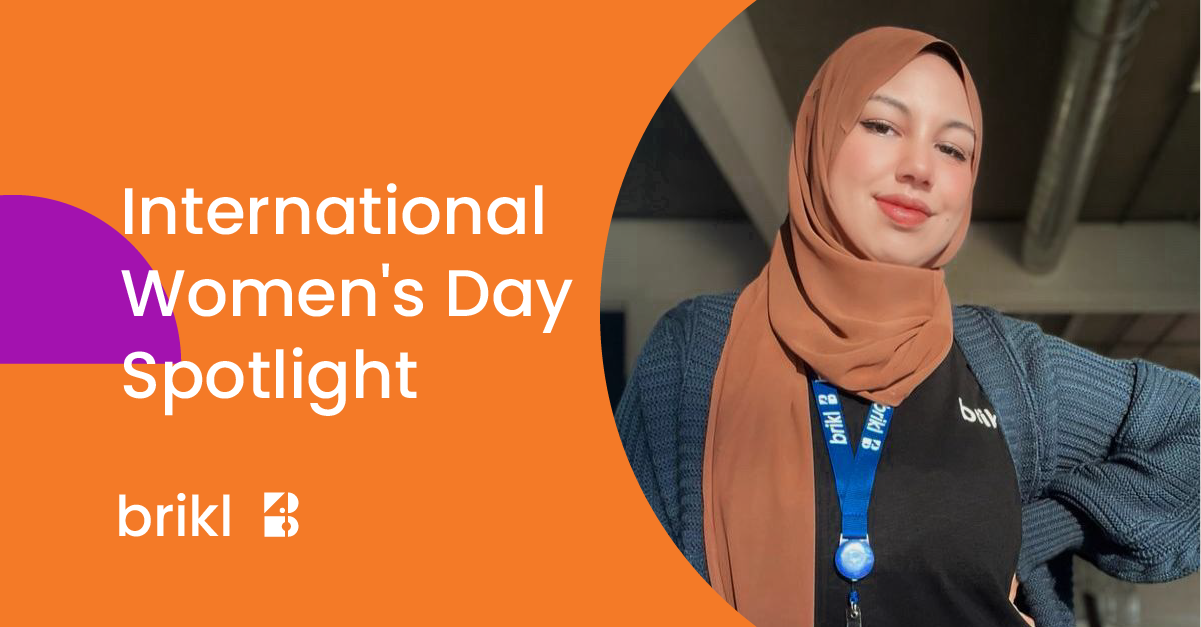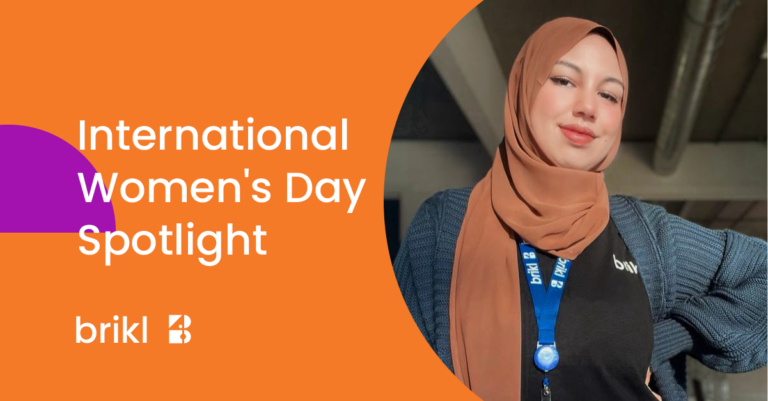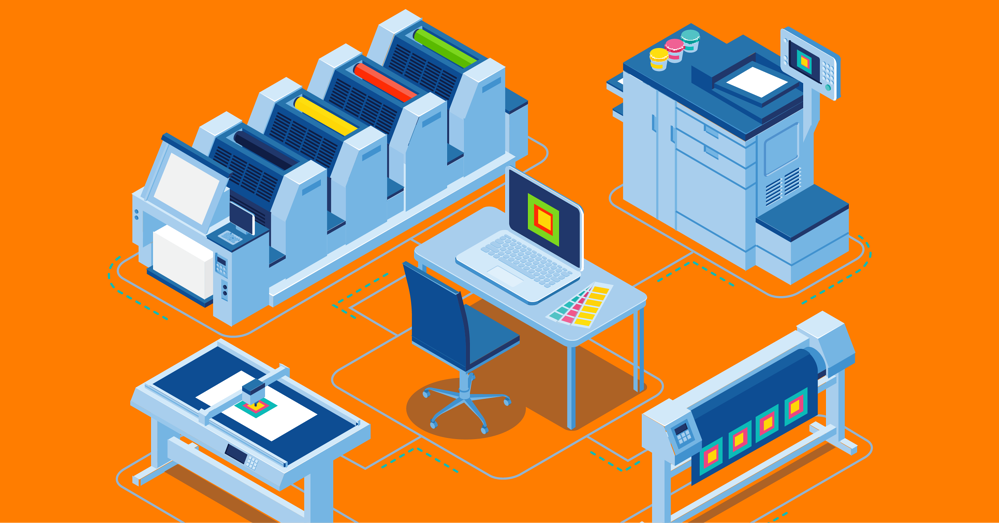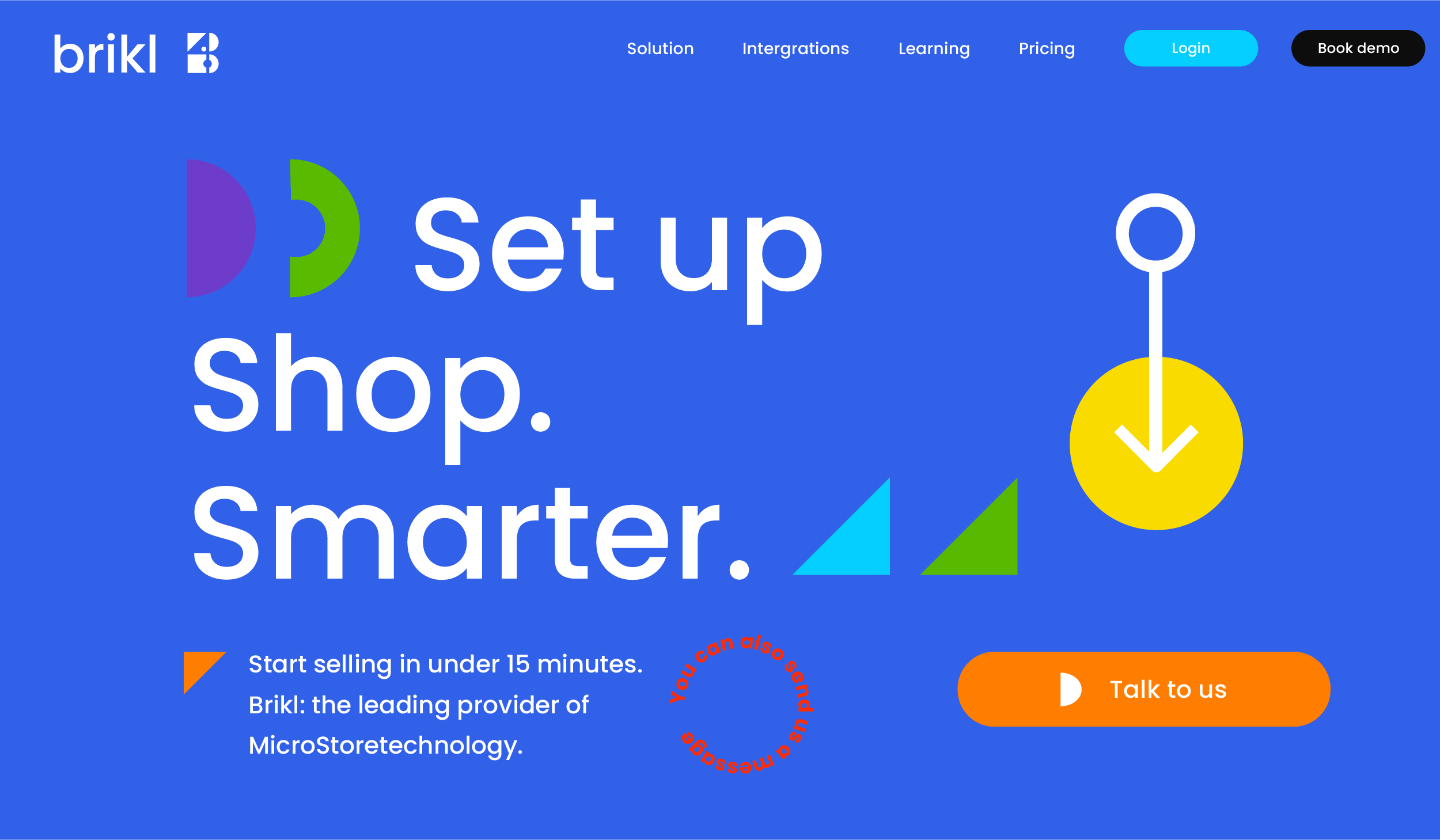Meryem Ouedghiri, the Marketing Team’s talented Frontend Developer, grew up in a small, ever-changing city called Berkane in northeastern Morocco.
Table of Contents
Meryem Ouedghiri, the Marketing Team’s talented Frontend Developer, grew up in a small, ever-changing city called Berkane in northeastern Morocco.
Her innate curiosity as a child, where she would take things apart (even occasionally destroy things. Happily, her parents had a sense of humor about that!) led to an interest in mechanic technology in high school. “I choose to specialize in it, but I was the only girl in the classroom,” Meryem comments. “It was a new discipline and we were the first group, so there was a misconception that mechanics just fix cars or something. In reality, it was about doing lots of maths, designing things, then releasing real machines.”
These were the happiest of times for Mery, but happiness, as she expresses, is best appreciated through hard-fought experiences.
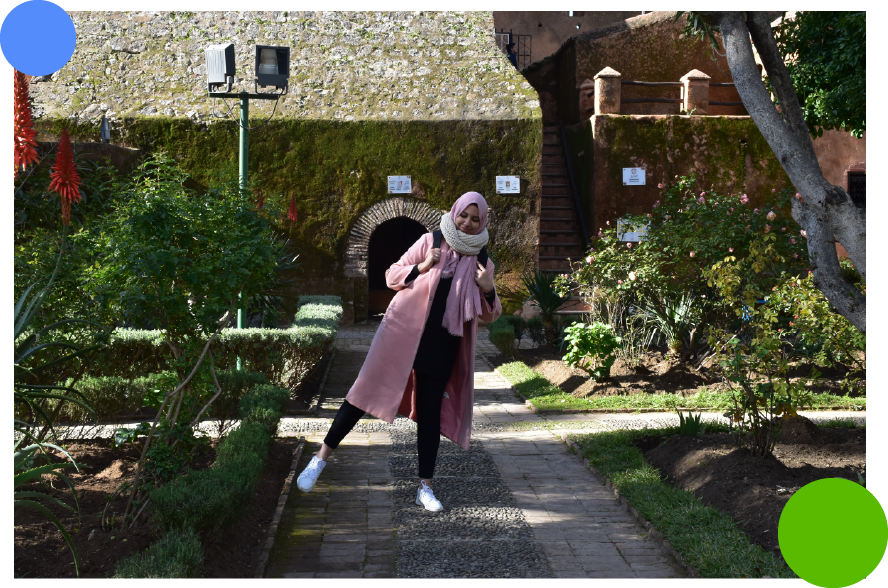
The good, the bad, and the character-forming
“The first significant thing that happened in my life is that I failed my first year of high school, which was a shock to my family,” Mery remembers. “I spent the summer vacation at home as a punishment. I decided to change my branch of studies and join a new class in Mechanic Technologies. I got my baccalaureate with a good mark and then went to one of the superior schools to study industrial product design. I did well and got my diploma after two years”.
At this point, Mery had to choose whether to finish school or get a job in another city far from hers. She’d specialized in mechanical technology, where she designed mechatronic systems using 3D design programs. But she was disappointed to find that after completing her studies, the only job on offer for someone with her degree was working as a car designer. These car companies were often located in big cities located around 600km from Berkane.
Then something happened that changed the course of her life: an arranged marriage.
“I didn’t know him, but he was a good man, and I started getting to know him. He was really good, and to be honest, I started loving him. So, we got engaged, and here, I started making the biggest mistake in my life. I built all my dreams and my life around him. I stopped school, waiting for him to be ready, and we got married.”
From that point onwards, Mery’s world, which seemed full of the possibilities of mathematics and intellectual ambition shrunk down infintisemally. She stayed at home talking to and messaging her husband. Friends, school, and job prospect became background noise for more than two years.
However, cracks were starting to appear below Mery’s feet. Her husband’s family had specific traditional values, which didn’t accommodate Mery’s need to be there for her father and manage things for her family. “In society, sons are preferred because they can work, have relationships, and manage everything, but I chose to break the rules and become this “son” to make my father feel safe knowing he has me,” Mery comments. Her need for freedom to make decisions butted heads with her husband’s family’s needs to have her stay at home or work without having too many commitments to others.
Mery and her husband’s separation was a wrecking ball that changed the shape of her future.
“It was the biggest shock… no one could console me. I found myself alone. This is one of the biggest mistakes that any girl can make, building her life around another person”.
Isolated, bereft, and depressed, Mery struggled with the cultural guilt and shame that she’d let her family down. They felt equally as helpless to console her. “I still remember hearing my father crying at night and praying at Fajr (the early morning Islamic prayer),” Mery comments. “He would buy anything he knew I liked just to make me feel good. My mom tried to act normal and pretend that nothing happened so I could feel normal and continue my life, but she was truly broken inside. My sister was angry and wanted to fight to make me feel that I had someone to defend me. They did a lot for me then, and they are still doing a lot to make me feel that they will always have my back.”
But after a few weeks of feeling lost, Mery felt strength return to her and a need to be a part of things again. She started taking her bike to a cemetery where her grandparents were buried, cleaning the cemetery, and taking care of the plants there. “I know that seems crazy, but it was the first thing that made me get out of depression and the bad feelings. Going out and doing something made me feel helpful,” she reflects.
Turning points, learning curves, and emotional resilience.
Mery decided that no job was too big or small for her: she just wanted one. She forgot about her degree and my studies and searched for work everywhere: grocery stores, libraries, printers. After a while, a big printer in her city called and offered her an unpaid, monthlong internship without even asking for an interview. If she did a good job, there would be the potential to stay on. “I was happy that I could be independent and help my father with home expenses,” Mery says emotionally. “I wanted to get out of this bad situation, meet people, feel independent, and feel useful for myself and my family”.
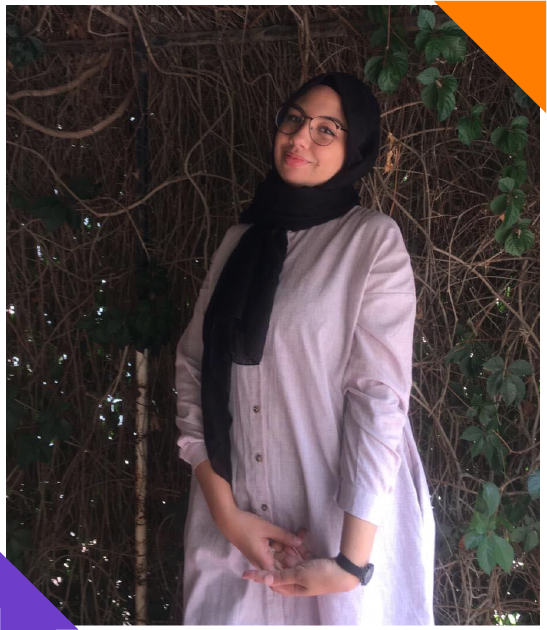
Hers first day was one of nervous anticipation. When she arrived, the owner told her to go upstairs and find an empty desk, and ask her two new colleagues what to do. She was instructed to sit and design a banner, and her surprise, she did a great job by their estimations.
“I didn’t even know what graphic design was”, she laughs. “But as it turned out, being a graphic designer was my first job. It was very challenging and I was faced with the decision to either learn graphic design or give up and search for a new job, so I embraced the challenge!”.
“I did not have a laptop to practice or learn. The only way was to work and learn”.
Mery used her phone to watch YouTube videos, took notes on everything she learnt about graphic design and Adobe Illustrator, then transferred her notes onto paper, applying what she’d learned at work.
“It was a challenging situation, but I was determined to make the most of my internship and learn as much as I could despite the obstacles. What made me lose my patience after months of work was when the owner started trying to get too close to me… Even though he is a married guy, it makes me feel unsafe and insecure going to work”.
Looking back on this memory, the pain is etched on Mery’s face. “It was like going to hell. I know this job helped me a lot to forget a hard period of my life, but it’s like replacing one pain with another.”
Under this pressure, Mery quit her job with a heavy heart. But an opportunity had simultaneously presented itself where one of the company’s clients, a director of a charity association for orphans, has left his number for her to contact him as a result of her sincere interest in what he was trying to achieve.
Depressed yet mustering all the mental fortitude she had to take a chance, Mery called him and requested to be a volunteer, offering her newfound skills in graphic design and photography.
Reframing darkness
The association was doing activities with kids such as teaching them language and maths, as well as drawing and taking them on trips. Whenever there is a religious celebration, they would buy clothes for the children and visit them.
As the organizartion’s newest volunteer, Mery started listening to the children’s stories: their stories of suffering and poverty embedded new and unexpected colors into her day to day.
“Being a part of this association made me feel like I didn’t have the right to be depressed. I lived with an amazing family – my parents and my sister. It’s true that we’re not rich, but I never felt like I needed anything. My sister and I always had good clothes to wear and good food to eat. My parents are compassionate and loving people. So, at what point did I have the right to complain?”.
Her deeply religious background made her think of what she’d been taught about The Prophet Muhammad, who’d said: ‘Look at those who are below you, and do not look at those who are above you, for that is more likely to hold you back from belittling the blessings that God has bestowed upon you’.
This Hadith encouraged humanity to avoid feelings of envy or jealousy towards those who may appear to have more wealth or status and focus on the blessings and to be grateful for them.
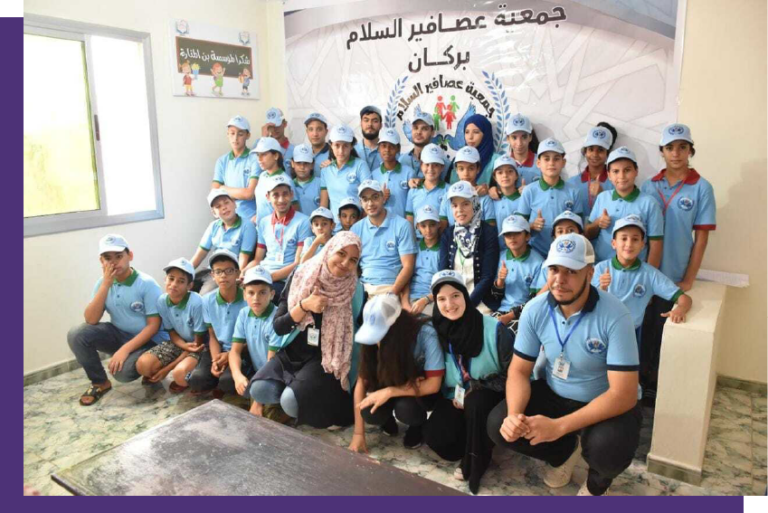
Empowered through education
After a couple of months, Mery felt the familiar tug of school. She registered at l’Office de la Formation Professionnelle et de la Promotion de Travaill (OFPPT) for software development because one day, while sitting in her room, she’d come across a video on Youtube where someone wrote “Hello, world!” using code, and fell in love with it.
“I kept checking if they had accepted my registration. Then, the day came when I found myself on the list. I was super happy. I still remember my first day. I was feeling like a little kid with a new bag full of toys, going to school”.
Here, she developed strong relationships with her colleagues and her teacher. Buoyed by the experience, Mery’s confidence to keep learning became exponential. She interned at an IT company, and learnt programming using ASP, C#, and Angular. After successfully completing school, the company asked her to stay with them as a member of the team.
“I worked with them for eight months, and then I moved to a bigger company where I released my first project and first live website. I continued to work with them during this period, and my personal life also started getting better including getting remarried. I applied for a visa to join my husband in Belgium, and they accepted it, so I joined him but continued working remotely.”
Life in Belgium
When you’re caught in the eye of life’s storm, it can be difficult to envision what calmer days will look like. During this period, Mery was working on an all-consuming project that would sometimes see her working up until 2AM and even working weekends. She knew she was due to leave her family home behind at some point to start her new life, but was too exhausted to think about it.
“I didn’t even get the chance to spend enough time with my parents. I also remember working on weekends. When I left I didn’t have time to have a feeling about the situation,” Mery laughs. “It felt like I was just going to some place and would be back soon, but when I arrived, I realized that I was in another country. My parents and sister would now be so far from me. Time goes by so fast. I’m growing older as my parents do, and I know that each year I go back, I will see changes in their faces. That really scares me.”
Eventually Mery stopped working remotely to focus on her new life in a new country. Mery observed the differences between Belgian and Moroccan culture, Moroccans leaning more towards conservative and traditional values with a strong emphasis on family and community. When someone new moves into a neighborhood, for example, it is customary for the neighbors to visit them and bring gifts like cakes or sweets. This creates a strong bond between neighbors and fosters a sense of camaraderie. However, in Belgium, despite being friendly and welcoming, had different customs.
“At first, it was a little challenging to get involved to find my place in Belgium. Before applying for jobs, I heard from some people around me that I could work in some Arab markets or big markets that accept Hijab, but if I wanted to work in an IT company or something similar, they would most likely ask me to remove my Hijab. This scared me because it was another side of being a foreigner that I hadn’t known about before. I had heard about it, but I never thought it would be true”.
Mery’s insecurities kicked in, but to her surprise, several companies were interested and called her and nobody asked about removing her hijab. At the same time, Mery had applied for school to learn development.
The beginning of Brikl
Mery still remembers receiving a message on LinkedIn asking her to meet and discuss the Junior Frontend position at Brikl. She’d had a lot of interview practice over the weeks so she wasn’t all that nervous.
“I had my first meeting with Suz Pathmanathan, the VP of Marketing at Brikl. She was so kind, understanding, and patient with my bad English. I was trying hard to show my skills by sharing some projects I was working on. I still remember how impressed Suz was, and how much this helped me feel comfortable”.
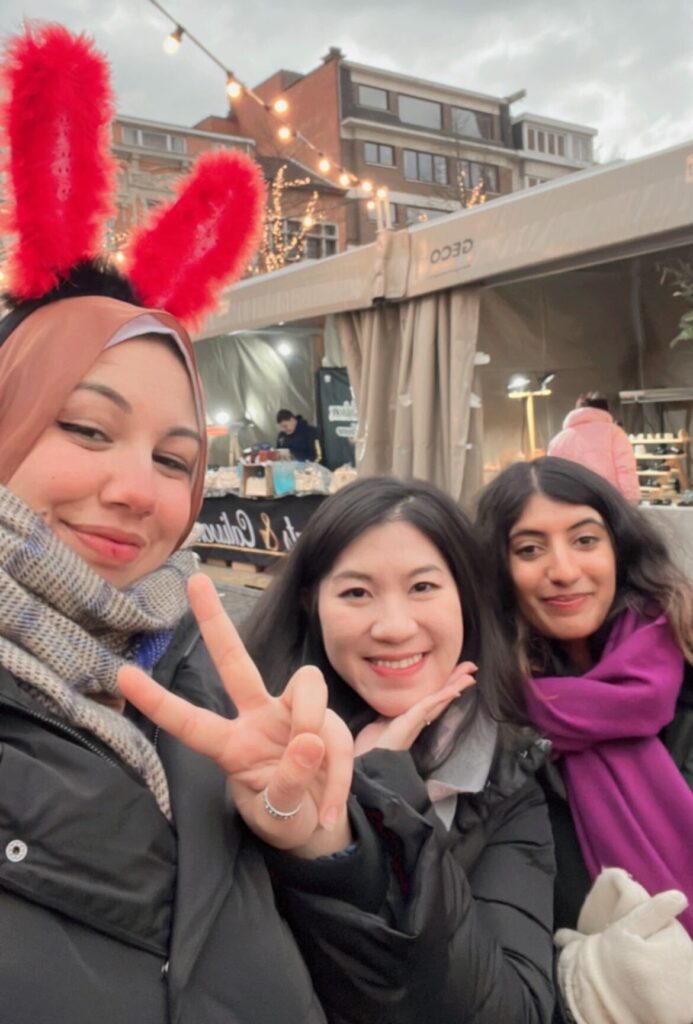
“I was looking for someone very specific at the time,” Suz comments. “We’re a small team, so I wanted someone with a brilliant mind who had the humility and collaboration skills to match their talent. Mery was the perfect candidate in every sense! Marketing is as much about the culture and values of a company as it is about the product, and she just embodied the spirit naturally.”
Jason Reinhardt, Co-Founder/CCO at Brikl asked Mery if she had experience working with HubSpot – a CRM. Her response was, ‘I’ve never worked with it, but I guarantee that I can learn anything new”. This was Mery’s attitude to any new challenge – to tackle it head on the same way she’d learned graphic design, watching YouTube on her cellphone.
“Jason told me that he looks for people who are willing to learn and bring something new, have new ideas, and even if the ideas fail, that’s okay. The most important thing is to be creative. What I felt in my meetings with Brikl is that I won’t be working like a robot, just doing what my superiors ask me to do. Instead, I will have the space to be myself, express myself, and use my skills. I have the freedom to do that because they encourage it”.
The next stage of the interview process was a test, but Mery faced a dilemma at the same time. To continue school or to join Brikl and earn a full-time wage; she’d been accepted at the school she’d applied to but was also looking to expand into a career. She decided that Brikl presented the best of both worlds; to be able to grow and learn while also giving her monetary freedom.
“The last interview arrived, my test page was ready. I had practiced my English sentences for the presentation and felt confident. The amazing VP of Marketing, Suz, was there, and I felt even more confident. The Senior Developer was also present, and he started asking me some technical questions. I had some keywords in my pocket, and I knew what I was saying. I felt prepared and ready to show them what I could do”.
The rest is history
Upon being offered the job, Mery was delighted.
“I was super happy; this was my first real job, it was flexible and in my domain of study. Additionally, there were no rules that asked me to take off my hijab. I could just be myself, with my hijab, my culture, and my beliefs, while working in this amazing multinational company.”
As a Junior Developer in the marketing team, Mery feels like her creativity has been amplified, not staunched. And that opportunities to learn and grow are readily available. But equally as important to Mery is the culture.
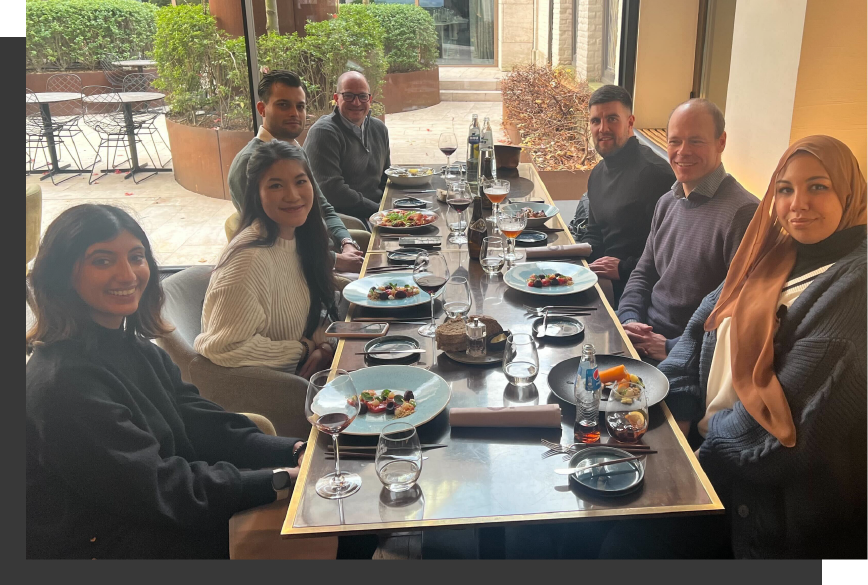
“I love how nice and caring everyone is. I remember that before starting, the CEO & Co-Founder of Brikl, Maarten Boone, brought my work laptop to me. He drove from another city to my home and was kind and modest enough to accept my and my husband’s invitation for a cup of tea in my modest apartment. And Jason is a really kind and optimistic guy who always accepts my culture and is in love with all the traditional sweets I bring with me each time I go to the office. I cannot pass without talking about Suz, my superior. She is the kindest person I have ever met, how much she cares, and leads us with a big smile. I believe the marketing team does their tasks with a lot of joy”.
“Sometimes I have this idea that if something were to happen, and I had to leave Brikl, would I regret working with them or feel sad or bad or angry? My response is no. Because life is a group of experiences, both good and bad, and this will always be a good experience for me. Because of them, I started my career in Belgium, and because of them, I discovered a new world of professionalism where your bosses ask you kindly to do tasks, rather than order you around. They treated me so well that I felt like they really cared about me as a person, not just an employee. I will never regret it. I’m just ready to be proud of being a part of this company for all my life.”
